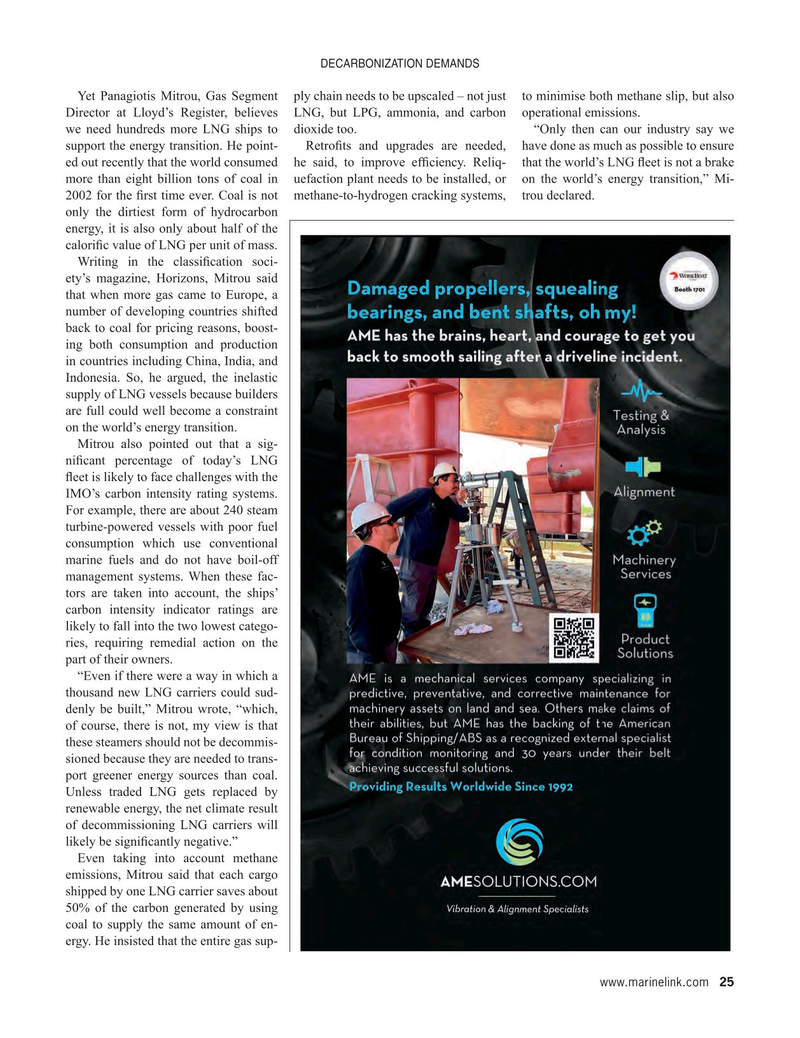
Page 25: of Maritime Reporter Magazine (August 2023)
Shipyard Annual
Read this page in Pdf, Flash or Html5 edition of August 2023 Maritime Reporter Magazine
DECARBONIZATION DEMANDS
Yet Panagiotis Mitrou, Gas Segment ply chain needs to be upscaled – not just to minimise both methane slip, but also
Director at Lloyd’s Register, believes LNG, but LPG, ammonia, and carbon operational emissions. we need hundreds more LNG ships to dioxide too. “Only then can our industry say we support the energy transition. He point- Retro? ts and upgrades are needed, have done as much as possible to ensure ed out recently that the world consumed he said, to improve ef? ciency. Reliq- that the world’s LNG ? eet is not a brake more than eight billion tons of coal in uefaction plant needs to be installed, or on the world’s energy transition,” Mi- 2002 for the ? rst time ever. Coal is not methane-to-hydrogen cracking systems, trou declared. only the dirtiest form of hydrocarbon energy, it is also only about half of the calori? c value of LNG per unit of mass.
Writing in the classi? cation soci- ety’s magazine, Horizons, Mitrou said that when more gas came to Europe, a number of developing countries shifted back to coal for pricing reasons, boost- ing both consumption and production in countries including China, India, and
Indonesia. So, he argued, the inelastic supply of LNG vessels because builders are full could well become a constraint on the world’s energy transition.
Mitrou also pointed out that a sig- ni? cant percentage of today’s LNG ? eet is likely to face challenges with the
IMO’s carbon intensity rating systems.
For example, there are about 240 steam turbine-powered vessels with poor fuel consumption which use conventional marine fuels and do not have boil-off management systems. When these fac- tors are taken into account, the ships’ carbon intensity indicator ratings are likely to fall into the two lowest catego- ries, requiring remedial action on the part of their owners.
“Even if there were a way in which a thousand new LNG carriers could sud- denly be built,” Mitrou wrote, “which, of course, there is not, my view is that these steamers should not be decommis- sioned because they are needed to trans- port greener energy sources than coal.
Unless traded LNG gets replaced by renewable energy, the net climate result of decommissioning LNG carriers will likely be signi? cantly negative.”
Even taking into account methane emissions, Mitrou said that each cargo shipped by one LNG carrier saves about 50% of the carbon generated by using coal to supply the same amount of en- ergy. He insisted that the entire gas sup- www.marinelink.com 25
MR #8 (18-33).indd 25 8/3/2023 11:00:45 AM

 24
24

 26
26
